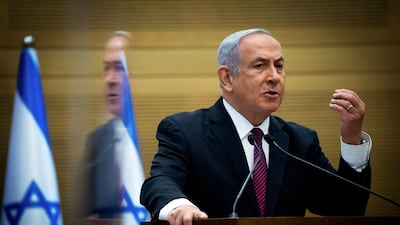The collapse of Israel’s coalition government led by Prime Minister Benjamin Netanyahu ends an alliance beset by divisions, but its demise is unlikely to usher in a period of political calm.
The dissolution of parliament at midnight on Tuesday came after Mr Netanyahu and his coalition partner Benny Gantz failed to pass a budget, prolonging Israel's economic uncertainty while politicians confront a rise in coronavirus cases.
Although Israelis may be weary at the prospect of a fourth election within two years, expected to be held in late March, few are surprised by the end of the alliance between the prime minister and his defence minister.
“It doesn’t look like Netanyahu ever wanted it to work, ever gave his partners any part in his government,” said Gideon Rahat, a senior fellow at the Israel Democracy Institute.
The coalition was sworn in last May after weeks of political wrangling, with Mr Gantz casting aside his campaign pledge to not govern alongside Mr Netanyahu.
After intense negotiations, Mr Gantz agreed to take over as prime minister in late 2021 and in the interim the former army chief would serve as defence minister.
"Even Gantz thought he had a very good agreement with him, with a lot of safeguards," Mr Rahat told The National.
The pair agreed on paper to pass a two-year budget, although Mr Netanyahu later demanded a one-year financial plan for 2020 and denied this was a ruse to prompt the coalition’s collapse.
“I did not want elections,” Mr Netanyahu told parliament late on Tuesday, vowing to win the upcoming vote. But the approaching election poses significant challenges for Israel’s longest-serving leader.
With coronavirus infections rising, the government is considering tightening restrictions and may impose a third nationwide lockdown. The pandemic has killed 3,136 people in Israel out of a population of nine million, health ministry data shows.
Electioneering will also kick off against the backdrop of Mr Netanyahu’s corruption trial, in which he is facing charges of bribery, breach of trust and fraud.
The allegations are central to months of weekly protest against the prime minister, with demonstrators rallying outside his Jerusalem residence and along motorways calling for his resignation.
But despite such obstacles, Mr Netanyahu still represents a king many voters can turn to during uncertain times, according to Michael Keren, from Western Galilee College in north Israel.
“I think he is less of a populist and more of a performer,” the professor said. “A magician who is able to appear as a saviour.”
Mr Netanyahu’s Likud is projected to be the largest party in the election, picking up 28 seats, but he would need to form a broad coalition to secure a majority in the 120-seat chamber.
His top challenger is Gideon Saar, a legislator who broke away from Likud this month to form the New Hope party. Mr Saar is expected to win 19 seats, according to Sunday's Channel 13 poll.
Mr Gantz’s Blue and White party was devastated by his decision to ally with the prime minister and is forecast to gain only five seats, leaving a substantial part of the electorate up for grabs.
“People who followed Gantz because they were anti-Bibi will now have to decide whether they’re right-wingers or left-wingers,” said Mr Keren, using the prime minister’s nickname.
He anticipated the creation of a left-wing bloc that could incorporate the Joint List, an alliance of Arab-led parties that have historically been excluded from government despite picking up 15 seats at the previous election.
Mr Netanyahu may, however, fare worse if faced with a plethora of small parties rather than one clear opponent.
“This puts him in a very complicated situation, because it’s very hard to have negative propaganda against so many competitors,” Mr Rahat said.
“I think Netanyahu is sweating now,” he said. “It’s going to be a tough election for him.”


